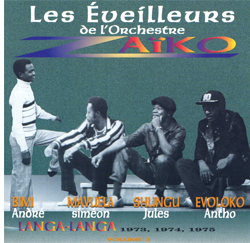|
 Zaiko Langa Langa, innovative Congolese rumba band, formed 1970. Michel Anto "Evoloko" (born Kinshasa, May 20, 1954; vocal), Matima Kinuani (born Sona Bata, Congo-Kinshasa, Apr. 14, 1951; died Liege, Belgium, May 29, 1996; guitar), Félix Manuwaku Waku (born Kinshasa, Aug. 19, 1954; guitar), Siméon Mavuela Somo (born Congo-Kinshasa; vocal), Meridjo Belobi (born Congo-Kinshasa; traps), D.V. Moanda (born Congo-Kinshasa, 1947; died Kinshasa, Jan. 9, 1984; founder), Muaka Mbeka "Bapius" (born Boma, Congo-Kinshasa, Feb. 27, 1951; bass), Nyoka Longo "Jossart" (born Congo-Kinshasa; vocal), Shungu Wembadio "Papa Wemba" (born Lubefu, Congo-Kinshasa, June 14, 1949; vocal), Enoch Zamuangana (born Congo-Kinshasa; died Kinshasa, 1992; guitar). Zaiko Langa Langa, innovative Congolese rumba band, formed 1970. Michel Anto "Evoloko" (born Kinshasa, May 20, 1954; vocal), Matima Kinuani (born Sona Bata, Congo-Kinshasa, Apr. 14, 1951; died Liege, Belgium, May 29, 1996; guitar), Félix Manuwaku Waku (born Kinshasa, Aug. 19, 1954; guitar), Siméon Mavuela Somo (born Congo-Kinshasa; vocal), Meridjo Belobi (born Congo-Kinshasa; traps), D.V. Moanda (born Congo-Kinshasa, 1947; died Kinshasa, Jan. 9, 1984; founder), Muaka Mbeka "Bapius" (born Boma, Congo-Kinshasa, Feb. 27, 1951; bass), Nyoka Longo "Jossart" (born Congo-Kinshasa; vocal), Shungu Wembadio "Papa Wemba" (born Lubefu, Congo-Kinshasa, June 14, 1949; vocal), Enoch Zamuangana (born Congo-Kinshasa; died Kinshasa, 1992; guitar).
Zaiko was the most successful of a number of so-called Kinshasa "youth bands" which formed in the late sixties and early seventies. With an eye toward Western rock, Zaiko's musicians dropped the usual horn section and played a boisterous, often faster-paced rumba complemented with flashy choreography and uproarious vocals that made older Congolese bands look staid by comparison.
Critics panned the raucous new style even as Zaiko's records ranged Kinshasa's hit parade in the early seventies. Guitarist Teddy Sukami's "Vie ya Mosolo" (life of money) examined money's corrupting influence. Wemba's "Liwa ya Somo" (fearful death) spoke of the ordinary citizen's difficult existence. The band launched new dance crazes with regularity, one of which, the cavacha, swept Kinshasa in 1973.
A pair of formidable musicians joined in 1974, singer Bozi Boziana and drummer Bakunde "Pablo" Ilondjoko. The latter's presence led to the use of tandem drum kits, manned by Pablo and Meridjo, in the band's concerts. Perhaps more important than the additions, splits developed within Zaiko that produced many new bands and gave rise to the term Clan Langa Langa. Wemba, Bozi, Evoloko, and Mavuela left near the end of 1974, a departure that eventually gave life to Wemba's Viva la Musica. In a 1980 shake-up Manuaku quit to form Grand Zaiko Wa Wa. The following year Evoloko and Bozi both left again, this time to help form Langa Langa Stars, which, in turn, yielded Choc Stars and Anti-Choc.
Zaiko toured regularly both in Africa and in Europe. When not on the road the musicians seemed to live in the studio, cranking out new hit singles and four or more albums a year by the early eighties. Zekete Zekete from 1983 produced a new dance craze of the same name. With Moanda's death the next year leadership shifted to Nyoka. Zaiko's music also seemed to change, mellowed by age and experience. Paiement Cash, a solid, four-song release from 1986 reflected the growing maturity. The same year Zaiko played in Japan for the first time.
Zaiko's most damaging blowup occurred in 1988 resulting in two Zaiko Langa Langa's: a faction of original members, led by Nyoka, using the additional epithet Nkolo Mboka, village headmen; an upstart faction, led by Pablo and singer Bimi Ombale, calling itself Famila Dei, family of God. Nyoka's faction outlasted Famila Dei, which dissolved in 1996. Further disagreement simmered among the remaining three longest-serving members of Zaiko as 1998 gave way to 1999. This led to Nyoka's dismissal of Meridjo and Bapius, who went on to form the short-lived Zaiko Langa Langa Universel. Nyoka shouldered on with new, younger recruits, but the result, as can be heard on Euréka from 2003 and 2005's Empreinte, was less than satisfactory.
At the dawn of the twenty-first century Zaiko entered a precarious fourth decade of existence making it Congolese music's longest running youth band, despite the advanced age of its leader and an otherwise complete change of personnel. In its early formations it served well as a prototype for younger bands that sought to challenge the dominance of the music's pioneers. Several of its innovations—the use of the solid body electric bass, traps, and choreography—forced the older groups to adopt them. Zaiko's prodding of the rumba to a faster pace kicked off the evolutionary spiral that eventually produced the Congolo-Paris hybrid, soukous.
© 2011 Gary Stewart
SELECT DISCOGRAPHY
Hits Inoubliables (vols. 1-4, Plus de Paris EPP03, 05, 06, 07) eighties recordings reissued 1996; Les Eveilleurs de L'Orchestre Zaiko Langa (vols. 1 & 2, Ngoyarto NG013 & NG014) seventies recordings reissued 1996; Les Pénétrés de L'Orchestre Zaiko Langa Langa (Ngoyarto NG017) seventies recordings reissued 1997.
Zaiko Nkolo Mboka: Avis de Recherche (Stern's STCD1068) 1995; Sans Issue (Sun JWS616) 1996; Backline Lesson One (Sonima SMCD1183) 1997; Nous y Sommes (N'Diaye ND049) 1998; Poison (JPS CDJPS45) 1999; Euréka! (JPS CDJPS217) 2003.
Zaiko Familia Dei: Revaloriser (Sonodisc BNM5009) 1995.
Zaiko Universel: Etumba ya la Vie (Air B. Mas BMP00155-2) 2000.
SELECT BIBLIOGRAPHY
C. Stapleton & C. May, African All-Stars (London, 1987); G. Ewens, "The Zaiko Cult," West Africa (Feb. 2, 1987); Manda Tchebwa, Terre de la chanson (Louvain-la-Neuve, Belgium, 1996); M. Sinnock, "Toujours Zaiko," The Beat (vol. 16, no. 1, 1997); M. Sinnock, "It's Been a Langa Langa Time," The Beat (vol. 18, no. 5/6, 1999); G. Stewart, Rumba on the River (London and New York, 2000); M. Sinnock, "Zaiko Revisited," The Beat (vol. 24, no. 3, 2005).
|

